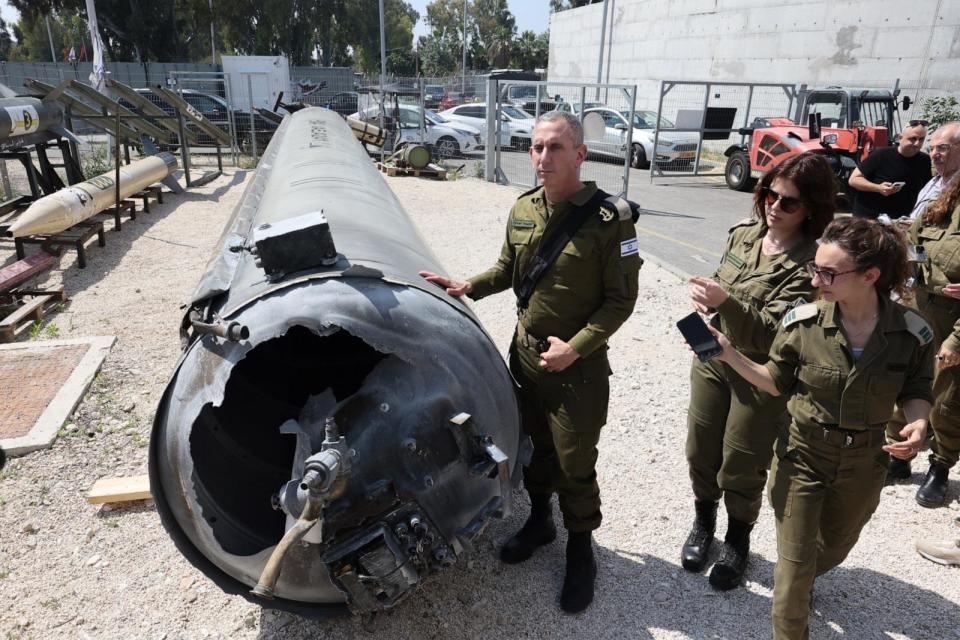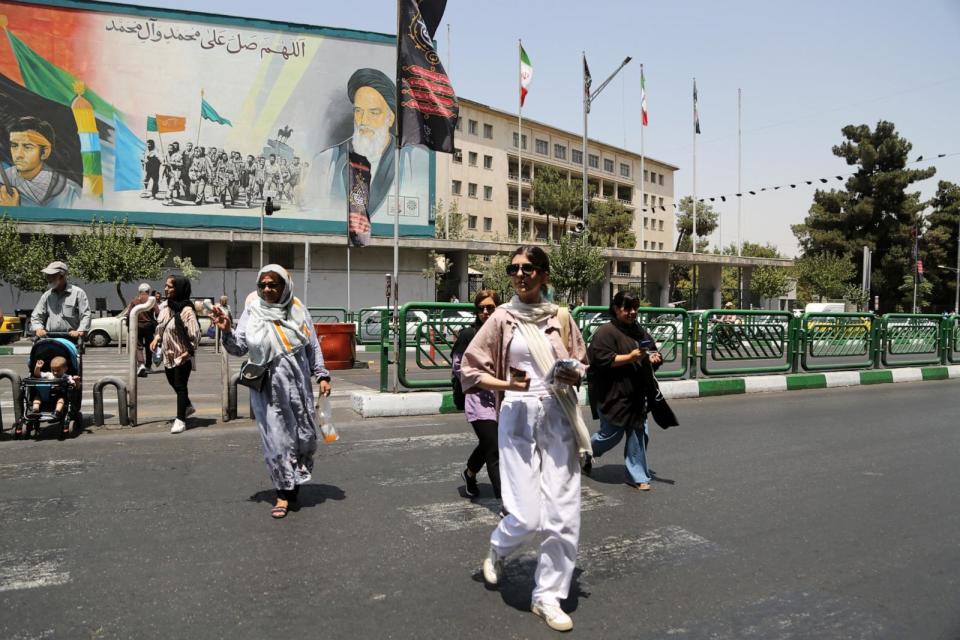Some Iranian women say they fear war with Israel amid violent hijab crackdown

In the wake of Iran's unprecedented airstrikes on Israel, dozens of Iranians gathered in Tehran's Palestine Square earlier this week to celebrate what the Iranian regime described as a retaliatory attack.
But interviews with women on the ground indicate that the scene, broadcast by Iranian state-run media in a country that lacks a free press, is not representative of how many other Iranians -- particularly women -- are feeling as Israel weighs its response.
ABC News spoke to several women in Iran who said the fear of an imminent war has been added to a long list of worries and hardships they have been grappling with for years. Their names have been changed due to concerns for their safety.
"The fear of the war is so crippling," Ramesh, a 30-year-old designer and architect, told ABC News via telephone on Wednesday. "And imagine on top of that is the anxiety of getting arrested by the hijab police and the stress of not being able to afford the rent for our flat every single month."
Hijab judiciary case opened against 2 Iranian journalists 1 day after their temporary release
Iran sent a barrage of more than 300 different types of drones and missiles toward Israel late Saturday, days after a suspected Israeli airstrike hit the Iranian consulate in Damascus, Syria. The strike on the consulate killed seven people, including a top Iranian commander. Israel has not confirmed that it was behind the attack on the Iranian consulate but has not denied it.
All but a few of Iran's missiles and drones were intercepted by Israel and its allies, including the United States, officials said.
The incident over the weekend came six months into a brutal war between Israel and Hamas, an Iran-backed Palestinian terrorist group that governs the Gaza Strip. Hamas led a surprise incursion into neighboring Israel on Oct. 7, 2023, killing about 1,200 people and taking more than 200 others hostage, with 129 believed to still remain in captivity in Gaza, according to the Israeli Prime Minister's Office. Since Oct. 7, Israeli forces have killed almost 34,000 people and injured more than 76,000 others in Gaza amid ongoing ground operations and aerial bombardment of the strip, according to the Hamas-controlled Gaza Ministry of Health.

A few hours after Saturday's retaliatory attack on Israel, Iranian authorities launched a new operation to arrest women who refuse to abide by the country’s law mandating they wear a hijab, covering their entire body except for their face, hands and feet. The operation, introduced by the police and dubbed "The Light Plan," aims to detain women who have ignored previous warnings about their dress from the country's so-called morality police, who regularly patrol the streets of Tehran and other cities, the Iranian Students' News Agency (ISNA) reported.
Images and videos of the latest hijab crackdown have surfaced on social media, with several Iranian women posting photos of what they say are bruises from being beaten by the morality police. One video purportedly shows Iranian police officers surrounding a woman and forcing her into a white van during a patrol.
"Imagine you turn on your TV to get news about the war and the danger you are living, and what you see is the news about the new round of the morality police operation," Ramesh said. "It seems what the regime cares about most is that if there is a war and my house collapses over my head, my corpse is dragged out of the rubble with a scarf covering my hair."
"We are on the verge of an all-out war and what is it that the state media tells us? A new round of the hijab police activities," she added. "Iran says its attack on Israel was a retaliation for the 12 people Israel killed in Syria. But we know at the end we, 80 million Iranians, will be paying the price."
Azam, a 35-year-old housewife and mother, said she "couldn't sleep" the night she saw the news about Iran's strikes on Israel.
"I went to my daughter's room and held her and grabbed her from sleep, and then I went to my son's room and held him," Azam told ABC News via telephone on Tuesday. "All I am worried about now is that if there is a war and they attack us, we may get hurt or separated."

Israeli Prime Minister Benjamin Netanyahu said Wednesday that Israel "will make our own decisions [about its response to Iran's attack] and the State of Israel will do everything necessary to defend itself." U.S. and U.K. officials have said they don't wish to see the situation escalate.
Maral, a 28-year-old website developer, said she and her family are living in "a horrible atmosphere of distress and anxiety," fearing they are "just tools in the hands of those in power."
"I am in shock and very worried about Israel's response," Maral told ABC News via telephone on Tuesday, adding that she has urged relatives who live in a town near one of Iran's nuclear facilities to pack their things and come stay with them in case Israel decides to target such sites.
"Another bitter thing here is the divide between people," she said. "The minority that are still supporters of the regime keep saying we need to stick together if the war happens, but many others are tired of the regime. Everything is so expensive and I am afraid of things getting even more expensive."
Iranian women tell why they openly flout hijab rules
Iran's economy and, subsequently, its people have suffered under years of widespread corruption and international sanctions. The value of the country’s currency, the rial, has plummeted 22 times in the past 10 years. In 2019, following the failure of nuclear talks between Iran and world powers, one U.S. dollar was equal to 130,000 Iranian rials. This week, after the Iranian strikes on Israel, the rial fell to 650,000 per dollar.
The high inflation rate and currency devaluation have left many Iranians struggling to afford basic necessities, including food. Zahra, a 65-year-old housewife and grandmother, said a kilogram (just over 2 pounds) of beef currently costs 7 million rials (about $11), which is expensive for a household that only earns 100 million rials (about $150) per month.
"We don't buy red meat or even chicken as much," Zahra told ABC News via telephone on Wednesday.
Zahra said she fears things will get worse if Israel's war in Gaza, which the United Nations warns has triggered a humanitarian crisis and imminent famine, spreads to her own doorstep in Iran. The concern of a wider war in the Middle East has been echoed by many regional analysts and experts.
"I have seen how innocent children are being killed, I have seen the hospitals being targeted in Gaza," Zahra added. "I told my granddaughter that everything was going to be alright and I kept telling myself the same, too."
Some Iranian women say they fear war with Israel amid violent hijab crackdown originally appeared on abcnews.go.com

